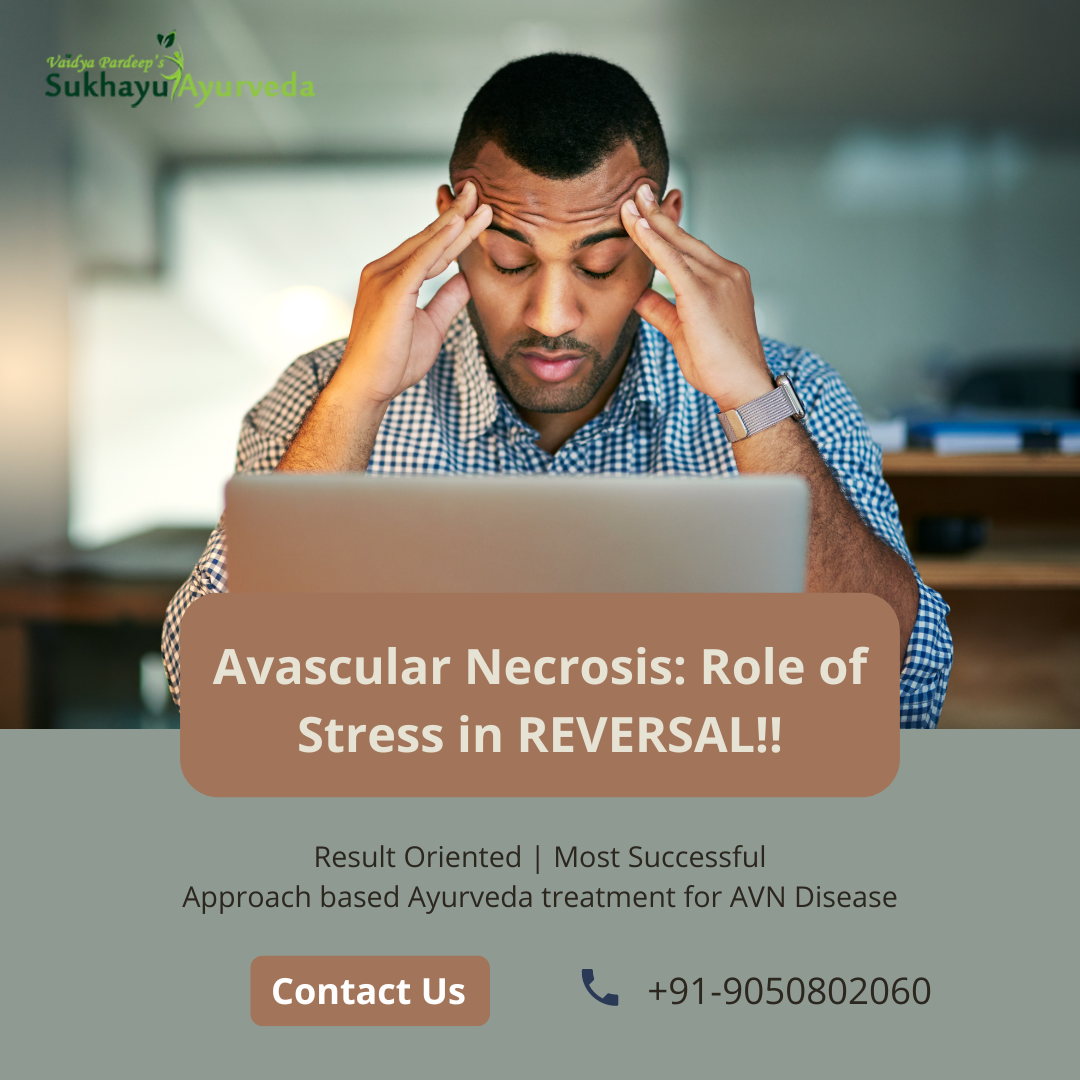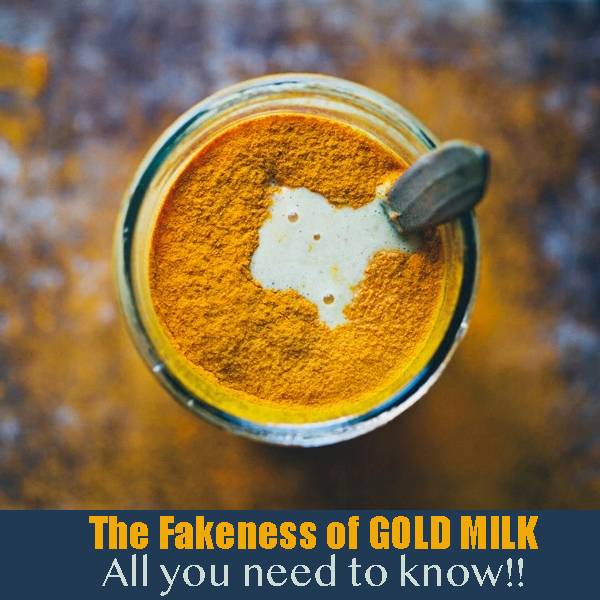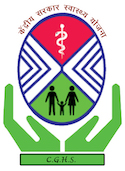The Role of Stress Management in Ayurvedic Treatment of Avascular Necrosis

Patients with a positive mind set and optimism get better results in the Avascular necrosis. As a clinician I always noticed this thing but it was very hard to comment on this, directly. Because for patients it is always hard to believe in something like this. For patients, Avascular necrosis (AVN) is just a condition where lack of blood supply causes the death of the bone. And bone is being considered mostly a “dead” hard tissue full of minerals- how can emotions and stress like thing impact on this.
For most of these patients, avascular necrosis aka osteonecrosis is about providing more minerals and livelihood to make sure that your bone will remain healthy. But human body is unimaginable. There are multiple layers in the human body.
AVN limits the joint movement, pain and eventually your bones are destined to collapse. There is a strong belief (due to the information all around) that reversal is not possible and you need to opt for the replacement. But truth is different. AVN is reversible, through Ayurvedic treatment of avascular necrosis.
We talk about diet, lifestyle and everything but stress is an often overlooked yet significant element that can complicate the decay of bone and vice versa. Because I belong to Ayurveda, it becomes more practical to me to think about – mind, body and soul all together. Managing stress is a crucial component in the Ayurvedic treatment of AVN. This blog post explores how stress affects AVN and discusses Ayurvedic techniques for managing stress, including mind-body practices like meditation and Pranayama.
How Stress Affects Avascular Necrosis
Stress has a profound impact on overall health, and its effects on AVN are no exception. Chronic stress can exacerbate the symptoms of AVN and hinder the body’s natural healing processes. Here are a few ways stress can affect AVN:
- Hormonal Imbalances: Stress triggers the release of cortisol, a hormone that, in excess, can lead to inflammation and weaken the immune system. This can slow down the healing process of bone tissues affected by AVN.
- Poor Blood Circulation: Stress can cause blood vessels to constrict, reducing blood flow to various parts of the body, including bones. This can worsen the blood supply issues already present in AVN.
- Nutritional Deficiencies: Chronic stress can lead to poor dietary choices and nutritional deficiencies, which are critical for bone health and repair.
- Increased Pain Perception: Stress and anxiety can amplify the perception of pain, making the symptoms of AVN more difficult to manage.
Ayurvedic Techniques for Managing Stress
There are three types of treatment approaches in Ayurveda.
A. Sattavavjaya: Controlling your mind part.
B. Yukti-vyapashya: Planning according to Doshas and pathologies.
C. Dev-vyapashya: Believing in existence and universal energy.
These three, represent- Mind, body and soul (in an order). Certainly, we work on the pathology of the disease but also we work on the stress aspect of the avascular necrosis treatment.
As a clinician, I strongly believe that never force anyone to avoid stress or remain stress-free. It should be easy and should come naturally and patient should not have stress of being stress-free. We use herbs, dietary adjustments and regulate the daily routine for the same-
- Herbal Remedies:
- Ashwagandha: This is Known as a powerful adaptogen, It helps the body to build endurance to the stress by reducing cortisol levels and promoting a sense of calm.
- Brahmi: Cognitive correctness is the key to the better thought process and brahmi does though its Rasayana activities.
- Tulsi (Holy Basil): Simple yet powerful adaptogen which can be used regularly in the diet, easily. Tulsi helps in many ways for the condition.
- Dietary Adjustments:
- Sattvic Diet: A diet that is light, nourishing, and easily digestible can help balance the mind and reduce stress. This includes fresh fruits, vegetables, whole grains, and legumes.
- Avoiding Stimulants: Reducing the intake of caffeine, alcohol, and processed foods can help lower stress levels.
- Daily Routine (Dinacharya):
- Regular Sleep Schedule: Maintaining a consistent sleep schedule helps regulate the body’s internal clock and reduces stress.
- Abhyanga (Self-Massage): A daily self-massage with warm, herbal oils can soothe the nervous system and promote relaxation.
Mind-Body Practices: Meditation and Pranayama
Mind-body practices are central to Ayurveda’s approach to stress management. The Meditation and Pranayama (breathing exercises) are powerful tools to calm the mind and enhance overall well-being.
Meditation
Meditation helps reduce stress by calming the mind and promoting a state of deep relaxation. It has been shown to lower cortisol levels, reduce anxiety, and improve emotional health. Here are some meditation practices beneficial for stress management:
- Mindfulness Meditation: This practice involves paying attention to the present moment without judgment. It helps reduce stress by promoting awareness and acceptance.
- Guided Meditation: Listening to guided meditation recordings can help focus the mind and induce a state of relaxation.
- Transcendental Meditation: This involves the repetition of a mantra to achieve a deep state of relaxation and mental clarity.
Pranayama
Pranayama, or yogic breathing, is a practice that involves controlling the breath to improve physical and mental health. It helps regulate the flow of prana (life force) in the body, reducing stress and promoting healing. Here are some Pranayama techniques beneficial for stress management:
- Nadi Shodhana (Alternate Nostril Breathing): This technique balances the nervous system and promotes mental clarity and calmness.
- Bhramari (Bee Breath): This involves making a humming sound while exhaling, which helps reduce anxiety and promotes a sense of tranquility.
- Ujjayi (Ocean Breath): This involves breathing through the nose while constricting the throat slightly, creating a soothing sound that calms the mind and reduces stress.
Stress management for AVN treatment: the verdict
You cannot talk “healthy” and “wonderful” things in a stinking room. The same is the condition for the treatment of avascular necrosis. Stress impacts the internal environment of the body which leads to the complex situation. At one hand we wish to see body regrowing the tissue and on other hand we are not giving a good-healthy environment!! This is contradictory.
Stress management for successful reversal of the AVN is mandatory. At Sukhayu Ayurved we believe in holding hands. Holding hands doesn’t mean “to be emotional” and “to over cautious” with patients. The main thing is to help indirectly with healing.
Visit Sukhayu Ayurved to learn more about how Ayurveda can support your journey in managing avascular necrosis.














